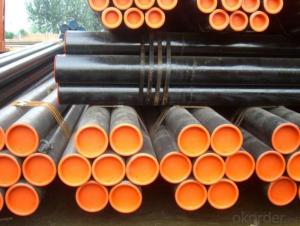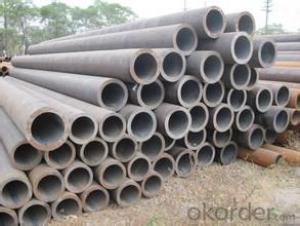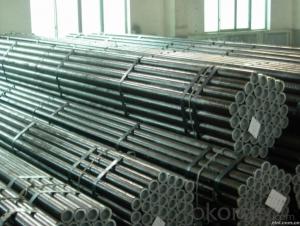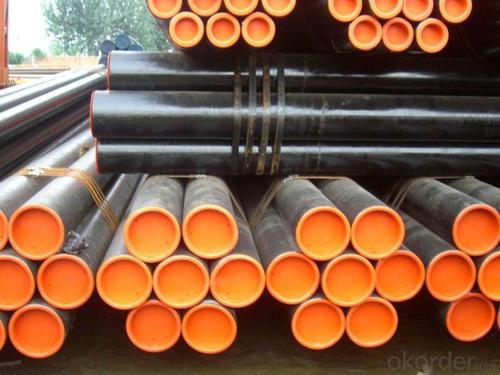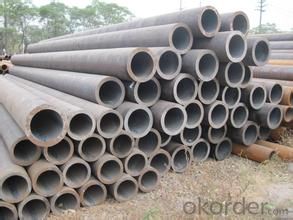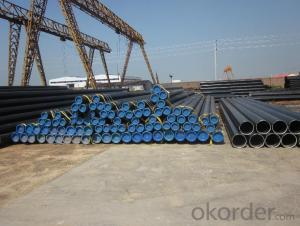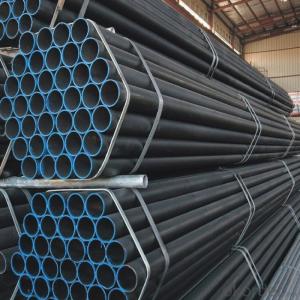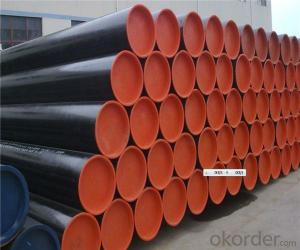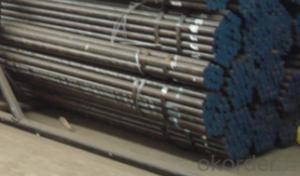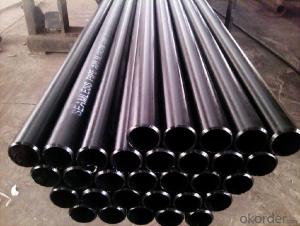Carbon Steamless Steel Pipe From China CNBM
- Loading Port:
- Tianjin
- Payment Terms:
- TT or LC
- Min Order Qty:
- 20 m.t.
- Supply Capability:
- 9000 m.t./month
OKorder Service Pledge
OKorder Financial Service
You Might Also Like
1、Structure of Seamless Pipe ASTM A106/53:
Seamless pipe is formed by drawing a solid billet over a piercing rod to create the hollow shell. As the manufacturing process does not include any welding, seamless pipes are perceived to be stronger and more reliable. Historically seamless pipe was regarded as withstanding pressure better than other types, and was often more easily available than welded pipe.
2、Main Features of the Seamless Pipe ASTM A106/53:
• High manufacturing accuracy
• High strength
• Small inertia resistance
• Strong heat dissipation ability
• Good visual effect
• Reasonable price
3、Seamless Pipe ASTM A106/53 Specification:
| 1 | Product | seamless steel pipe | |
| 2 | Standard | U.S.A. | ASTM A53/A106/A178/A179/A192/A210/A213/ A333/A335/A283/A135/A214/A315/A500/A501/A519/A161/A334 API 5L/5CT |
| Japan | JIS G3452/G3454/G3456/G3457/G3458/G3460/3461/3462/3464 | ||
| German | DIN 1626/17175/1629-4/2448/2391/17200 SEW680 | ||
| Britain | BS 1387/1600/1717/1640/3601/3602/3059/1775 | ||
| Russia | GOST 8732/8731/3183 | ||
| China | GB/T8162/T8163 GB5310/6579/9948 | ||
| 3 | Material Grade | U.S.A. | Gr. B/Gr.A/A179/A192/A-1/T11/T12/T22/P1/FP1/T5/4140/4130 |
| Japan | STPG38,STB30,STS38,STB33,STB42,STS49, STBA23,STPA25,STPA23,STBA20 | ||
| German | ST33,ST37,ST35,ST35.8,ST45,ST52,15Mo3, 13CrMo44, 1.0309, 1.0305, 1.0405 | ||
| Britain | Low, Medium, high | ||
| Russia | 10, 20, 35, 45, 20X | ||
| China | 10#, 20#, 16Mn, 20G, 15MoG, 15CrMo, 30CrMo, 42Crmo, 27SiMn, 20CrMo | ||
| 4 | Out Diameter | 21.3mm-609.6mm | |
| 5 | Wall Thickness | 2.31mm-40mm | |
| 6 | Length | As per customers' requirements | |
| 7 | Protection | Plastic caps/ Wooden case | |
| 8 | Surface | Black painting/varnished surface,anti-corrosion oil, galvanized or as per required by customer | |
4、Packaging & Delivery
Packaging Details: | seaworthy package,bundles wrapped with strong steel strip |
Delivery Detail: | 15-30days after received 30%TT |
5、FAQ of Seamless Pipe ASTM A106/53:
①How is the quality of your products?
Our products are manufactured strictly according to national and internaional standard, and we take a test
on every pipe before delivered out. If you want see our quality certifications and all kinds of testing report, please just ask us for it.
Guaranteed: If products’ quality don’t accord to discription as we give or the promise before you place order, we promise 100% refund.
②How about price?
Yes, we are factory and be able to give you lowest price below market one, and we have a policy that “ for saving time and absolutely honest business attitude, we quote as lowest as possible for any customer, and discount can be given according to quantity”,if you like bargain and factory price is not low enough as you think, just don’t waste your time.Please trust the quotation we would give you, it is professional one.
③Why should you chose us?
Chose happens because of quality, then price, We can give you both.Additionally, we can also offer professional products inquiry, products knowledge train(for agents), smooth goods delivery, exellent customer solution proposals.Our service formula: good quality+good price+good service=customer’s trust
SGS test is available, customer inspection before shipping is welcome, third party inspection is no problem.
6、Seamless Pipe ASTM A106/53 Images:
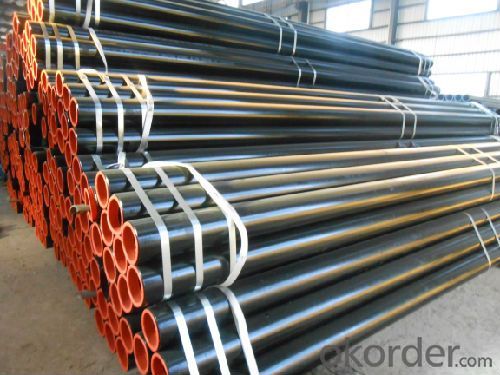
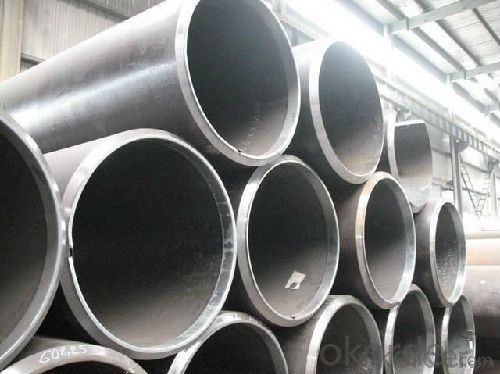
- Q: How are steel pipes used in the agricultural sector?
- Steel pipes are commonly used in the agricultural sector for various purposes such as irrigation, drainage, and livestock handling. They are used to transport water from a source to fields, as well as to distribute water evenly across crops through irrigation systems. Steel pipes also help in draining excess water from fields and preventing waterlogging. Additionally, they are utilized for constructing fences, gates, and cattle handling facilities, ensuring the safety and containment of livestock.
- Q: Can steel pipes be used for oil and gas pipelines?
- Yes, steel pipes are commonly used for oil and gas pipelines due to their high strength, durability, and resistance to corrosion.
- Q: How are steel pipes used in the manufacturing of chemical processing equipment?
- Steel pipes are commonly used in the manufacturing of chemical processing equipment due to their durability, corrosion resistance, and ability to withstand high temperatures and pressures. These pipes are used to transport fluids, such as chemicals, gases, and liquids, throughout the various stages of the manufacturing process. In chemical processing equipment, steel pipes are primarily used for two main purposes: as conduits for the transportation of raw materials and as channels for the distribution of processed products. Firstly, steel pipes are used to transport raw materials, such as chemicals and solvents, from storage tanks or external sources to the various processing units within the equipment. These pipes ensure the safe and efficient movement of these materials, allowing for accurate and controlled dosage and distribution. Steel pipes are preferred due to their strength, which enables them to handle the high pressures and temperatures involved in chemical processing. Secondly, steel pipes are used to distribute the processed products throughout the equipment. Once the raw materials have undergone various chemical reactions and transformations, the resulting products need to be transported to the next stage or collected for further processing. Steel pipes are ideal for this purpose as they can withstand the corrosive nature of many chemicals and can handle the high temperatures encountered during these processes. Furthermore, steel pipes are also used in chemical processing equipment for their versatility and compatibility with various chemicals and solvents. They can be easily customized to accommodate specific requirements, such as different pipe sizes, shapes, and fittings. This flexibility allows for efficient design and installation, ensuring a seamless flow of materials and products throughout the equipment. Overall, steel pipes play a crucial role in the manufacturing of chemical processing equipment by providing a reliable and efficient means of transporting raw materials and distributing processed products. Their durability, corrosion resistance, and ability to withstand high temperatures and pressures make them an essential component in ensuring the safe and efficient operation of chemical processing equipment.
- Q: What is the thermal expansion coefficient of steel pipes?
- The thermal expansion coefficient of steel pipes is typically around 0.000011 to 0.000012 per degree Celsius, which means that for every degree Celsius increase in temperature, the length of the steel pipe will expand by approximately 0.0011% to 0.0012%.
- Q: How do steel pipes handle pressure surges?
- Steel pipes are designed to handle pressure surges effectively due to their inherent strength and durability. The high tensile strength of steel allows it to withstand significant pressure fluctuations without deforming or bursting. Additionally, the seamless construction of steel pipes ensures a smooth and continuous flow, minimizing the impact of pressure surges. Furthermore, steel pipes can be reinforced with additional support structures, such as braces or anchors, to further enhance their ability to handle pressure surges.
- Q: What is the difference between cast iron and steel pipes?
- The main difference between cast iron and steel pipes lies in their composition and manufacturing process. Cast iron pipes are made from a strong, durable material that consists primarily of iron, carbon, and silicon. They are cast in molds and have a thick, heavy wall. Steel pipes, on the other hand, are made from an alloy of iron and carbon, usually with smaller amounts of other elements. They are manufactured using various methods, such as seamless or welded, and can have different wall thicknesses depending on their intended use. In summary, cast iron pipes are heavier and more brittle, while steel pipes are lighter and more flexible, making them suitable for different applications.
- Q: Can steel pipes be used for underground fuel storage tanks?
- Yes, steel pipes can be used for underground fuel storage tanks. Steel pipes are commonly used for various applications, including underground storage tanks for fuel. They are strong, durable, and resistant to corrosion, making them suitable for long-term storage of fuels such as gasoline, diesel, and oil. Additionally, steel pipes can be easily welded together to create a seamless and secure tank structure. However, it is important to ensure that the steel pipes used for underground fuel storage tanks are properly coated with corrosion-resistant materials to protect them from any potential damage caused by exposure to moisture or the chemicals present in the fuel. Regular inspection and maintenance are also necessary to ensure the integrity of the tank and prevent any leaks or environmental hazards.
- Q: Are steel pipes suitable for potable water applications?
- Yes, steel pipes are suitable for potable water applications. They are commonly used in water distribution systems due to their durability, strength, and resistance to corrosion. However, proper coating and lining techniques should be employed to ensure the water remains safe for consumption and to prevent any potential leaching of contaminants from the pipe material.
- Q: What are the different methods of cutting steel pipes?
- There are several different methods of cutting steel pipes, including manual methods such as hacksaw or pipe cutter, as well as mechanical methods like band saw, plasma cutting, or laser cutting. Each method has its own advantages and is chosen based on factors such as the thickness of the pipe, precision required, and production volume.
- Q: What are the different types of steel pipe coatings for corrosive environments?
- There are several types of steel pipe coatings that are commonly used for corrosive environments. These include fusion bonded epoxy (FBE) coating, three-layer polyethylene (3LPE) coating, three-layer polypropylene (3LPP) coating, and coal tar enamel (CTE) coating. FBE coating provides excellent corrosion resistance and is commonly used for underground pipelines. 3LPE and 3LPP coatings combine a layer of epoxy, an adhesive layer, and a polyethylene or polypropylene outer layer, offering superior protection against corrosion and mechanical damage. CTE coating, although less common nowadays, is still used for certain applications due to its resistance to water and chemical corrosion.
Send your message to us
Carbon Steamless Steel Pipe From China CNBM
- Loading Port:
- Tianjin
- Payment Terms:
- TT or LC
- Min Order Qty:
- 20 m.t.
- Supply Capability:
- 9000 m.t./month
OKorder Service Pledge
OKorder Financial Service
Similar products
Hot products
Hot Searches
Related keywords
